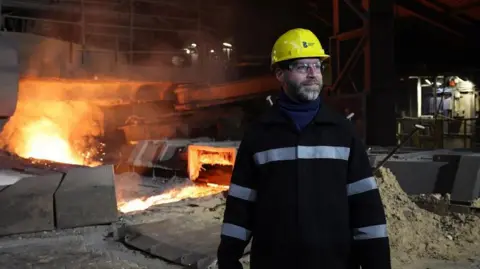In recent comments, Business Secretary Jonathan Reynolds emphasized the necessity for the Labour Party to effectively narrate the story of the working-class communities it aims to represent. Speaking at a gathering with parliamentary journalists, Reynolds articulated the need for a stronger connection between the party’s message and the aspirations of these communities. He criticized Nigel Farage, the leader of Reform UK, for his proposals to reopen coal mines in Wales, labeling his views as an “absolute parody” of what working-class citizens truly desire.
Reynolds shared a personal anecdote regarding his family background, recalling his grandfather’s experience as a coal miner. He noted, however, that his grandfather advised his father against following in his footsteps, directing him instead toward a career as a firefighter. This narrative highlights a generational shift in the perception of work within working-class families—where the ambition was not only to earn a living but to pursue professions that ensure safety and respect.
A spokesperson from Reform UK countered Reynolds’ remarks, asserting the party’s commitment to advocating for the reindustrialization of Britain. This statement signifies that Reform UK sees an opportunity in revitalizing traditional industries, such as coal mining, as part of their broader economic strategy.
Ahead of his upcoming visit to Port Talbot, Farage articulated his party’s intent to allow coal mining in Wales as a crucial component of their plan to reopen the Port Talbot steelworks, stating that while it won’t be quick or easy, it aligns with their vision for Britain’s industrial future. Reynolds, representing the Stalybridge and Hyde constituency in Greater Manchester, responded sharply to these proposals, indicating they do not resonate with the needs of the people he represents.
He pointed out the alienation felt among voters today, contrasting it with the opportunities his parents had when they were starting out. They were able to buy a house rather than delay financial stability for a honeymoon. This comparison underscores a prevailing sense of insecurity in the current generation, indicating that the dream of homeownership and stability is becoming increasingly elusive.
Reynolds also touched on the evolution of education and career paths, emphasizing his own background—a culmination of attending a comprehensive school and Manchester University. However, he noted the disconnection this causes for many working-class individuals who may not see the same opportunities available today. His assertion that “the story is not available right now in this generation for British people” speaks to a broader narrative about the aspirations that have shifted over time and the barriers that prevent many from realizing these ambitions.
Responding to Reynolds’ criticism, a Reform UK spokesperson stated that Labour’s approach continues to lead to the deindustrialization of towns across the nation, indicating a failure to preserve well-paying jobs in critical industries. They maintained that Labour’s policies reflect a fundamental misunderstanding of the working class, contrasting their vision for job creation against Labour’s perceived shortcomings.
In light of these discussions, the Labour Party faces a critical challenge in conveying a message that resonates with working-class experiences and aspirations. The emphasis on storytelling, articulated by Reynolds, suggests a need for Labour to ground its policies in the realities of everyday lives, reinforcing the connection between political action and the welfare of the communities it serves. As the political landscape evolves, both Labour and Reform UK must navigate these conversations, striving to bridge the gap between policy and the lived experiences of working-class individuals across the United Kingdom.



